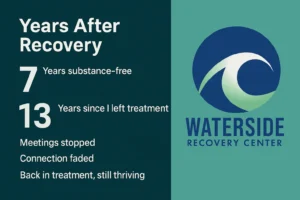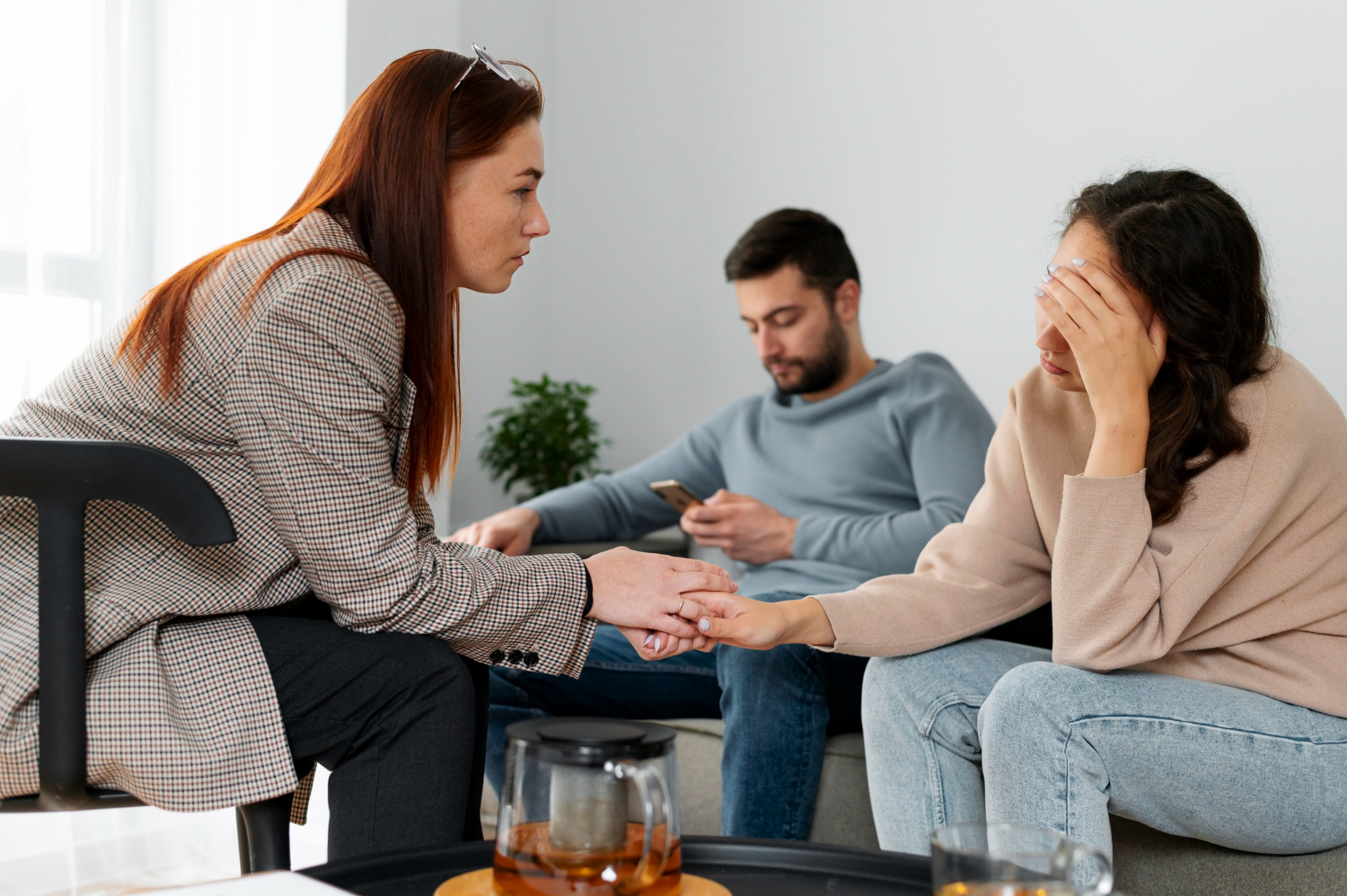I used to think being sober meant I’d never need help again.
When I left Waterside Recovery the first time, I had years of clean time behind me. I had structure, a job, people who trusted me again, and enough “normal” in my life that I could look anyone in the eye and say, “I’m doing okay.”
But there’s a world of difference between okay and alive.
Over time, I stopped going to meetings. I started isolating, just a little. I didn’t relapse—but I did lose something I couldn’t name at first. I stopped growing. Stopped reaching. Stopped feeling like recovery was something I got to participate in—and started feeling like it was a long list of things I had to keep avoiding.
That slow disconnection can be harder to talk about than active addiction. But I wasn’t the only one who felt it.
Eventually, I walked back into the place that helped me build this life in the first place—Waterside’s Opiate Addiction Treatment program in Plymouth County, MA. And what I found wasn’t shame. It was a return to connection, purpose, and myself.
I thought “not using” was enough
At first, staying clean was a full-time job. Avoiding old triggers, rebuilding trust, relearning how to function. That work saved me.
But a few years out, when things finally got quieter, I started to drift. The urgency was gone—but so was the passion. I wasn’t waking up excited to live—I was waking up relieved I hadn’t ruined everything… again.
I thought that feeling would pass. It didn’t. It just settled in.
There’s a version of recovery that looks perfect from the outside but feels empty inside. That was me.
And for a while, I thought I was the only one.
The fear of returning almost kept me stuck
It took me months to pick up the phone. Not because I was using—but because I was scared of what it would mean if I walked back into treatment after being away for years.
What would they say? Would I be treated like a failure? Would I have to explain myself?
I kept imagining the look of disappointment on someone’s face. But none of that happened.
When I finally reached out, the first thing I heard was, “We’re glad you called.”
Not “What happened?” Not “You again?” Just a welcome.
That one moment gave me permission to stop trying to hold it all together on my own.
I found people who understood the long road
I wasn’t alone. That surprised me more than anything.
In group, I met others who had been clean for five, ten, even fifteen years—and were still coming back, not because they failed, but because they were evolving. Because sobriety wasn’t the final goal—sustainable purpose was.
We talked about different things. Not just cravings or triggers, but shame, emotional flatness, spiritual fatigue. What it’s like to “outgrow” old tools. What happens when the meetings stop working, when the joy fades, when you’re too proud to admit you’re lost.
These weren’t people starting over. They were people choosing to grow again. Just like me.

Recovery isn’t a phase—it’s a relationship
Being back in Waterside’s opiate addiction treatment program reminded me of something I forgot:
Recovery isn’t a timeline. It’s a relationship—with yourself, with your values, with your community.
And like any relationship, it takes effort. Presence. Honesty. Course-correcting.
You don’t stop watering a plant just because it bloomed once.
My sobriety wasn’t broken. But the connection that sustained it had gone silent.
At Waterside, I remembered what it felt like to speak that silence—and have someone nod like they’d been there too.
I reconnected with my “why”
The first time I got clean, my “why” was simple: I didn’t want to die.
But a decade later, that wasn’t enough. Staying clean to avoid destruction wasn’t sustainable anymore. I needed a reason to live—really live.
That’s what this second round of treatment gave me: a space to ask, “What now?” and “Who do I want to be?” without shame or pressure.
I discovered that recovery isn’t just about who you’re not anymore. It’s about who you still get to become.
I didn’t have to start over—I got to move forward
Coming back didn’t erase my progress. That was one of my biggest fears.
Instead of going backward, the team at Waterside helped me re-enter from where I was emotionally—not just where I’d left off years ago. They honored the work I’d done and helped me build on it with fresh insight.
I wasn’t a beginner, but I wasn’t finished either. And in that in-between space, I found freedom.
I wasn’t less-than for needing support—I was wiser for seeking it.
For anyone wondering if it’s “too late”—it’s not
Maybe you’re where I was—years out, no relapse, but something inside feels off. You’ve drifted. You’re tired. You’re wondering if this is all recovery has to offer.
Let me be clear: you are not alone. You are not broken. You are not too far gone or too long gone. And you don’t need a crisis to come back.
Whether you’re in Plymouth County or looking for Opiate Addiction Treatment in Marshfield , MA, you have a place here.
This isn’t about starting over. It’s about starting again—with more clarity, more courage, and more community.
Voices from Long-Term Alumni
“I didn’t relapse—but I forgot how to feel anything. Treatment helped me wake back up.”
– T., 7 years clean
“I came back because I wanted more than just staying clean. I wanted peace.”
– L., 10 years clean
“I thought needing help meant I’d failed. Now I know it means I’m still growing.”
– D., 13 years clean
FAQ: Returning to Opiate Addiction Treatment as a Long-Term Alumni
Q: Do I have to relapse to return to treatment?
A: No. Many alumni return to Waterside not because they used, but because they feel disconnected, stuck, or emotionally numb. Coming back is about reconnection—not failure.
Q: Will I have to start over?
A: No. The team meets you where you are. You won’t be treated like a beginner unless that’s what you need. Treatment is adapted to your current emotional and recovery needs.
Q: What if it’s been 5+ years since I was in treatment?
A: That’s more common than you think. Long-term alumni are welcome, and your story is honored. Many clients return after years—often at new life stages.
Q: Can this still help me if I’m not in crisis?
A: Absolutely. Recovery evolves, and sometimes you need a new toolkit. The program supports growth, not just survival.
Q: I live outside Plymouth County—can I still come?
A: Yes. Waterside also supports alumni looking for Opiate Addiction Treatment in Bristol County, MA and surrounding areas. Reach out to explore your options.
You haven’t failed by needing help again—you’ve matured into someone who knows the value of staying connected.
Call (866) 671‑8620 to learn more about our Opiate Addiction Treatment services in Plymouth County, MA.


